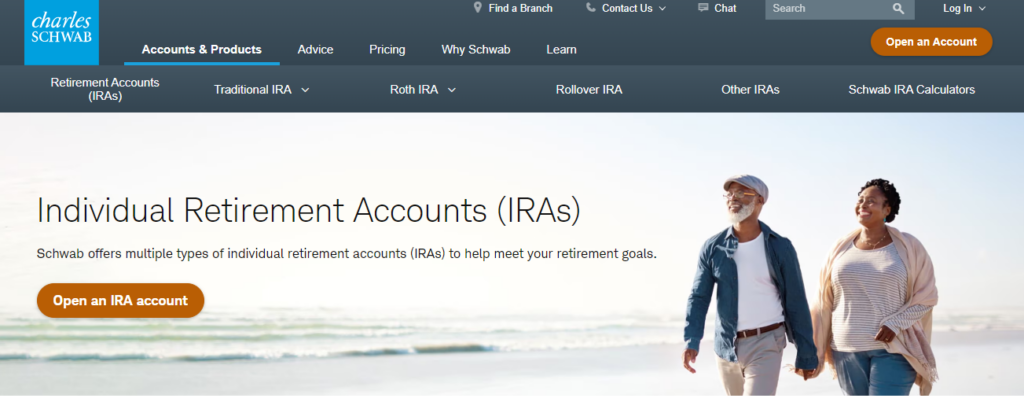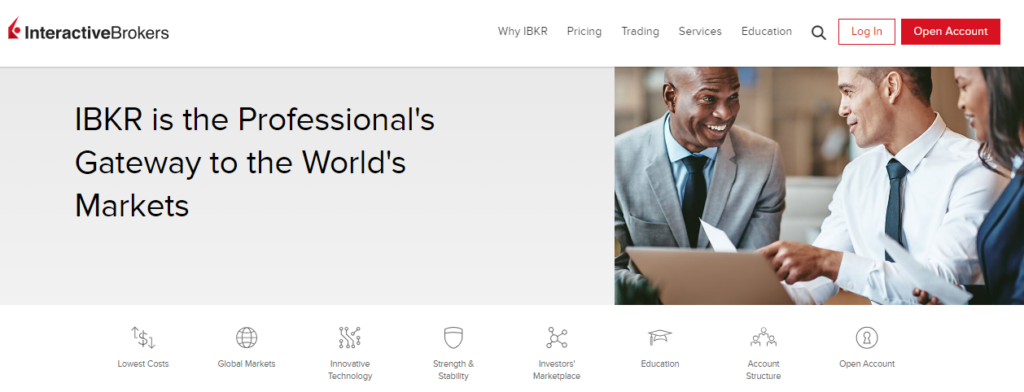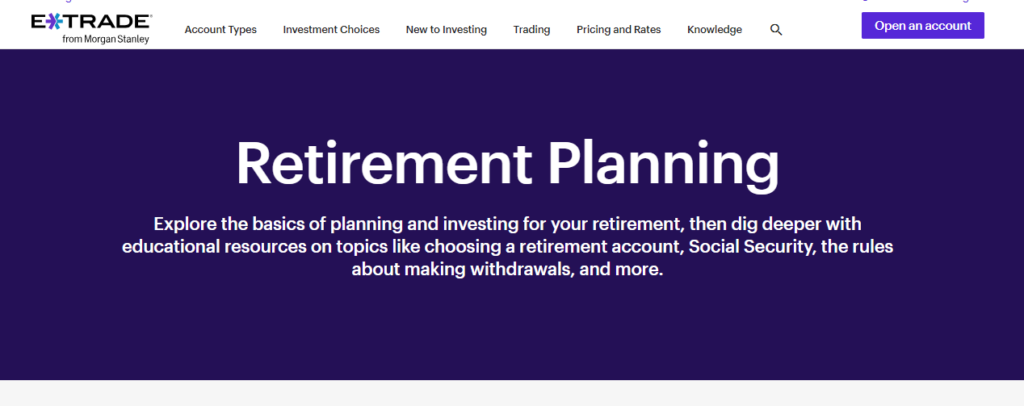Planning for retirement often begins with the exploration of an IRA account, which is a pivotal tool in securing financial stability for the golden years. An IRA offers a tax-advantaged haven for investments, allowing individuals to cultivate their savings with the potential for robust growth while deferring taxes until retirement.
However, choosing the right IRA provider can be daunting, considering factors like fees, investment choices, and educational resources. To ease this decision-making process, we’ve curated a guide to the best IRA account in 2024.
What is an IRA?
Understanding Individual Retirement Accounts (IRAs) is essential for anyone planning for retirement. An IRA is a tax-advantaged investment account that allows individuals to save and invest for their retirement years. These accounts offer a wide range of investment options, including stocks, bonds, mutual funds, exchange-traded funds (ETFs), certificates of deposit (CDs), and cash equivalents. IRAs are available through various financial institutions, such as banks, credit unions, brokerage firms, and online investment platforms, providing individuals with flexibility in choosing where to open their accounts.
One of the key features of IRAs is their tax advantages. Contributions to traditional IRAs may be tax deductible, providing immediate tax benefits, while earnings within the account grow tax-deferred until withdrawals are made in retirement, at which point they are taxed as ordinary income. In contrast, contributions to Roth IRAs are made with after-tax dollars, but earnings grow tax-free, and qualified withdrawals in retirement are tax-free as well. By taking advantage of these tax-advantaged accounts and making informed investment decisions, individuals can effectively grow their retirement savings and achieve their long-term financial goals.
Benefits of investing in an IRA account
Investing in an Individual Retirement Account (IRA) offers numerous benefits that can significantly enhance one’s retirement savings and financial security.
- Tax advantages: Contributions to traditional IRAs may be tax-deductible, reducing taxable income, while earnings grow tax-deferred. Roth IRAs offer tax-free growth potential, with contributions made with after-tax dollars and qualified withdrawals in retirement being tax-free.
- Compound growth: By deferring taxes on investment gains within the account, IRAs allow for compounded growth over time, maximizing the accumulation of retirement savings.
- Investment flexibility: IRAs offer a wide range of investment options, including stocks, bonds, mutual funds, ETFs, CDs, and cash equivalents, allowing individuals to build diversified portfolios aligned with their financial goals and risk tolerance.
- Retirement savings supplement: IRAs serve as a valuable supplement to employer-sponsored retirement plans like 401(k)s, providing individuals with additional opportunities to save and invest for retirement.
- Tailored investment strategies: With the ability to choose between traditional and Roth IRAs, as well as various investment options, individuals can tailor their investment strategies to their specific financial situations and long-term objectives.
- Future financial security: Investing in an IRA enables individuals to proactively save for retirement, ensuring they have sufficient funds to support their lifestyle and needs during their non-working years.
- Estate planning: IRAs can be used as part of an estate planning strategy, allowing individuals to designate beneficiaries and pass on assets to heirs in a tax-efficient manner.
Best IRA Account in 2024
Whether you’re a novice investor or a seasoned pro, finding the right IRA provider is crucial for securing your financial future. Let’s delve into the top contenders to determine which one aligns best with your retirement goals and investment preferences.
1. Fidelity

Fidelity emerges as the top choice for IRA accounts in 2024, earning its reputation as the best overall provider due to its combination of low fees, extensive investment choices, and comprehensive educational resources. Offering traditional, Roth, simplified employee pension plans (SEP), and savings incentive match plans for employees (SIMPLE) IRAs, Fidelity caters to a diverse range of investor needs. Its broad selection of investment options includes in-house and third-party mutual funds, exchange-traded funds (ETFs), individual stocks, options, certificates of deposit, and Treasurys. One of Fidelity’s standout features is its lack of minimum account balances or commissions on U.S.-listed stocks, ETFs, or options, making it accessible to investors of all levels.
Fidelity provides investors with a wealth of educational resources, allowing them to get up to speed quickly on various investment strategies. With 24/7 customer service via phone or virtual assistant, as well as live chat availability during weekdays and weekends, Fidelity ensures that investors receive prompt assistance whenever needed.
Drawbacks: Fidelity does not offer futures trading, and its premium offering, Fidelity Wealth Services, requires a $50,000 account minimum. Additionally, there’s a $0.65-per-contract fee for options trading, which could add up for active traders. Despite these limitations, Fidelity’s overall package makes it an attractive choice for investors seeking a robust IRA platform with comprehensive features and support. Also, read our Fidelity review for a more in-depth overview of the platform.
2. Charles Schwab

Charles Schwab stands out as the premier choice for IRA accounts in 2024, particularly for its exceptional educational resources. Offering traditional, Roth, simplified employee pension plans (SEP), simplified employee pension plans (SIMPLE), rollover, inherited, and custodial IRAs, Schwab caters to a broad spectrum of investors. What sets Schwab apart is its array of retirement calculators, market commentary, and educational materials, empowering investors to make informed decisions about their financial futures. Whether novice or experienced, investors can access a wealth of resources to enhance their understanding of investment strategies and retirement planning.
Moreover, Schwab provides access to thousands of proprietary and third-party mutual funds and ETFs, ensuring ample choices for diversifying portfolios. With no minimum deposit required to open an IRA and no commissions on U.S.-listed stocks, ETFs, or options, Schwab offers accessibility and affordability.
Drawbacks: Schwab imposes a $50 fee for full outgoing transfers and a $95 account closure fee, which may deter some investors. Additionally, the absence of savings bonds limits the platform’s investment options compared to some competitors. Despite these limitations, Schwab’s robust educational resources make it an excellent choice for investors seeking to expand their financial knowledge while building a retirement nest egg.
3. Interactive Brokers

For advanced DIY investors seeking sophisticated features and a wide array of investment options, Interactive Brokers (IBKR) shines as the premier choice for IRA accounts in 2024. Offering traditional, Roth, simplified employee pension plans (SEP), and simplified employee pension plans (SIMPLE) IRAs, along with rollover and inherited accounts, IBKR caters to the needs of experienced investors. With access to stocks, ETFs, mutual funds, options, futures, bonds, currencies, and Treasury bills, IBKR provides unparalleled versatility for constructing diversified portfolios tailored to individual preferences and risk tolerance.
IBKR offers advanced trading capabilities through its web platform and Trader Workstation desktop application, empowering investors to execute complex strategies with ease. With no account minimums and competitive pricing, IBKR provides cost-effective solutions for active traders.
Drawbacks: IBKR lacks in-house research, which may require investors to rely on external sources for market analysis. Additionally, the commission structure, with up to $0.0035-per-share commission on U.S.-listed stocks and ETFs, may not be suitable for investors with smaller portfolios. Moreover, IBKR does not offer premium wealth advisory services, limiting support for investors seeking personalized guidance. Despite these limitations, IBKR’s advanced features and comprehensive investment options make it an attractive choice for seasoned investors looking to maximize their IRA accounts.
4. E*TRADE by Morgan Stanley

For investors prioritizing mobile accessibility and user-friendly trading platforms, ETRADE by Morgan Stanley emerges as the top choice for IRA accounts in 2024. Offering traditional, Roth, simplified employee pension plans (SEP), simplified employee pension plans (SIMPLE), beneficiary, custodial, and rollover IRAs, ETRADE caters to a diverse range of investors. The platform’s standout feature is its intuitive mobile app, which provides seamless account management and trading on the go. Whether executing trades, monitoring portfolios, or accessing educational resources, investors can enjoy a streamlined experience directly from their smartphones.
Moreover, E*TRADE boasts zero commissions on stocks, ETFs, and mutual funds across all IRA types, coupled with no annual IRA fees or minimum balance requirements, making it cost-effective for investors of all levels.
Drawbacks: ETRADE does not offer savings bonds or annuities, limiting investment options compared to some competitors. Additionally, the $75 fee for transferring an IRA to another institution may deter investors seeking to switch providers. Despite these limitations, ETRADE’s emphasis on mobile functionality and competitive pricing make it an attractive choice for investors seeking convenience and accessibility in managing their IRA accounts.
5. Vanguard

Vanguard stands as the premier choice for IRA accounts in 2024, particularly for investors focused on low-cost mutual funds and ETFs. Offering traditional, Roth, simplified employee pension plans (SEP), and simplified employee pension plans (SIMPLE) IRAs, along with rollover, inherited, and custodial accounts, Vanguard caters to a wide range of investor needs. What sets Vanguard apart is its extensive lineup of in-house mutual funds and ETFs, renowned for their low fees and broad diversification across asset classes, strategies, and geographies. By prioritizing cost-effectiveness, Vanguard empowers investors to build diversified portfolios while minimizing expenses.
Vanguard provides a full range of IRA options with no commissions for trades and no account minimums, ensuring accessibility for investors of all levels. Additionally, investors can access retirement calculators and worksheets to aid in long-term planning.
Drawbacks: Vanguard does not offer spot bitcoin ETFs or 24/7 customer service, which may inconvenience some investors. Moreover, the absence of futures trading limits options for advanced investors seeking additional asset classes. Despite these limitations, Vanguard’s commitment to low-cost investing and long-term value makes it an attractive choice for investors seeking to maximize their IRA accounts.
Conclusion
In conclusion, choosing the right IRA account is a pivotal step in securing a prosperous retirement future. Our exploration of the top IRA providers in 2024 has revealed a diverse landscape of options, each offering unique features and benefits.
As you navigate the complexities of retirement planning, consider not only the fees and investment options but also the educational resources and customer support offered by each provider. By aligning your IRA account with your long-term financial goals and risk tolerance, you can cultivate a portfolio that maximizes growth potential while minimizing unnecessary expenses.
Ultimately, the best IRA account for you will be one that empowers you to take control of your financial future with confidence. Whether you’re a novice investor just starting to save for retirement or a seasoned pro fine-tuning your portfolio, the right IRA provider can make all the difference in achieving your retirement dreams. So, take the time to explore your options, weigh the pros and cons, and embark on the journey towards a secure and prosperous retirement.

